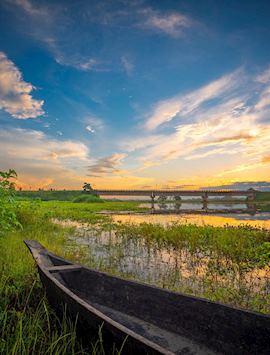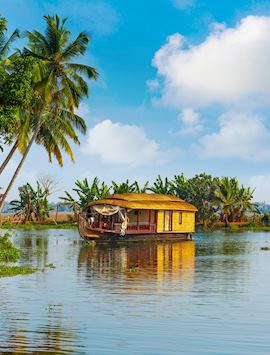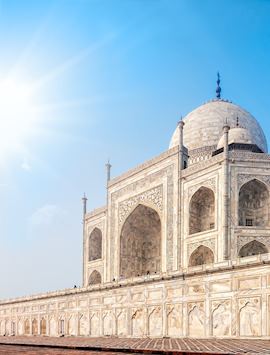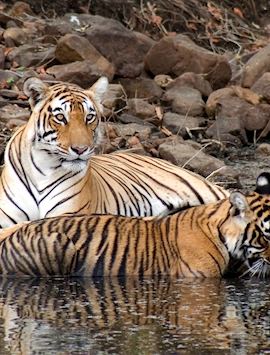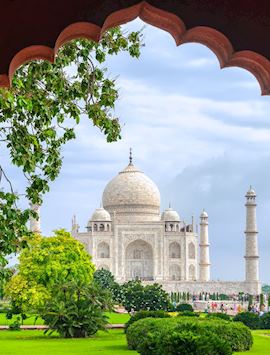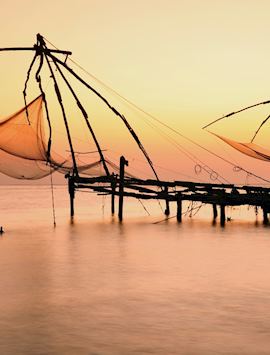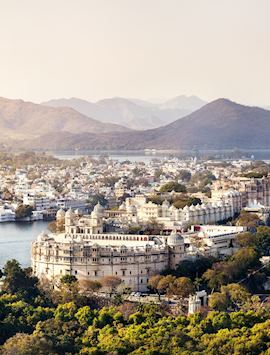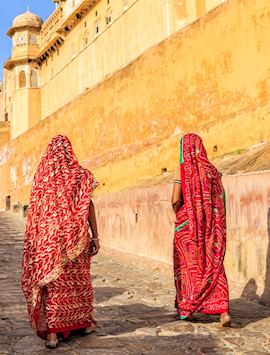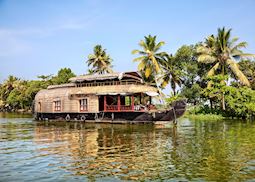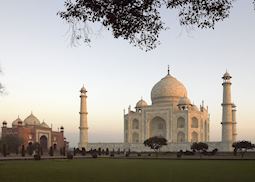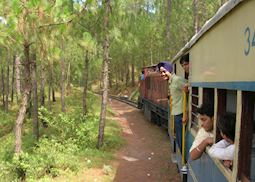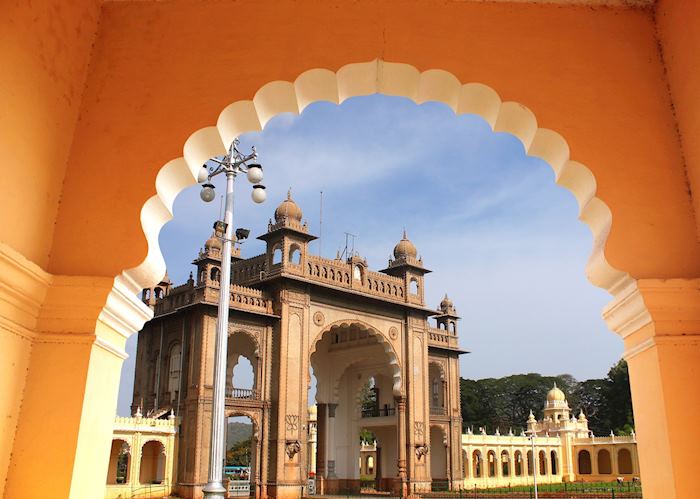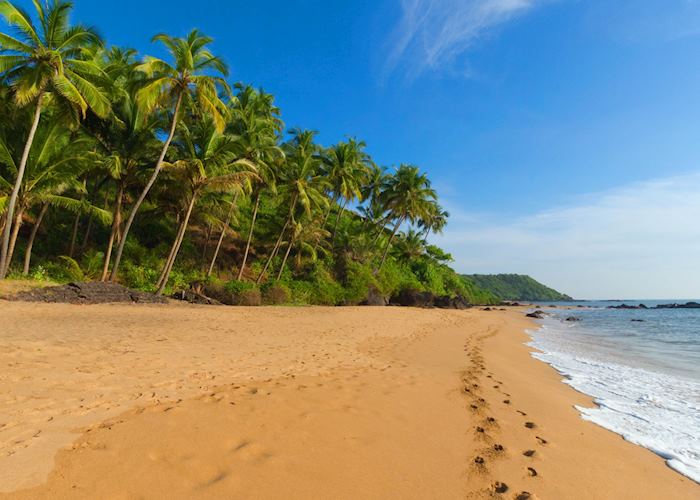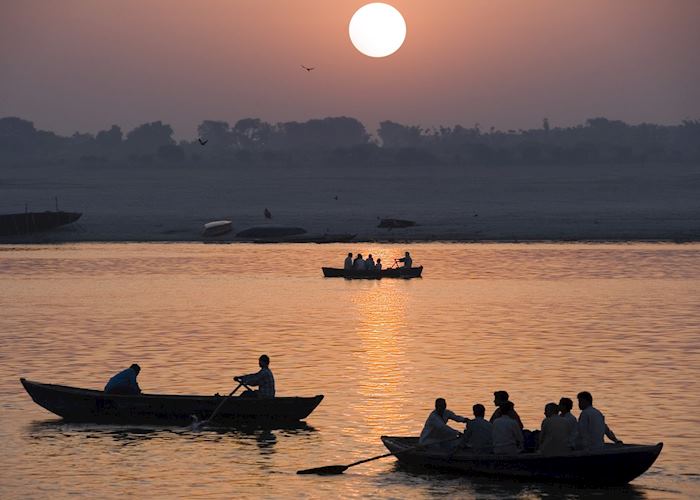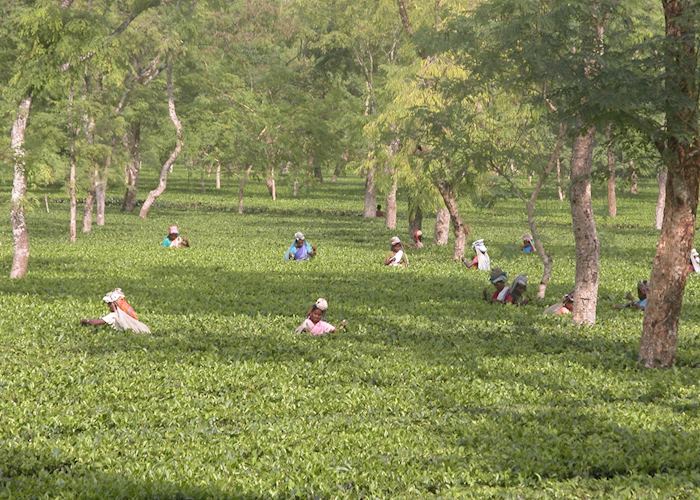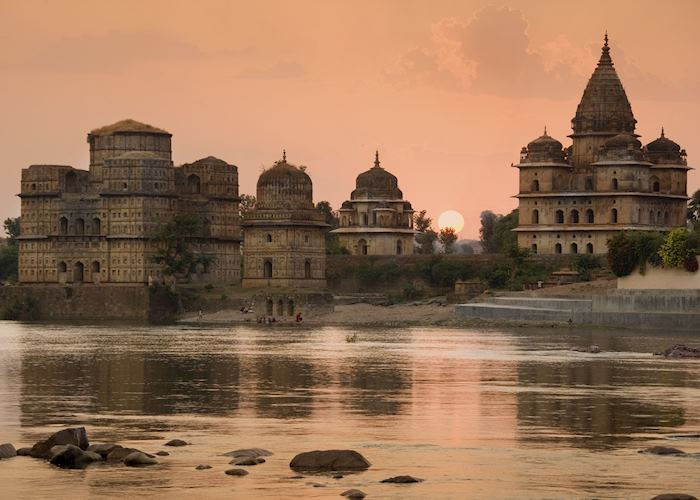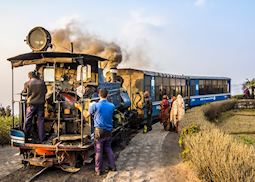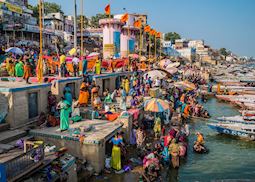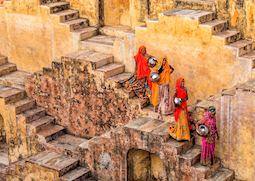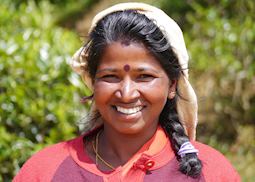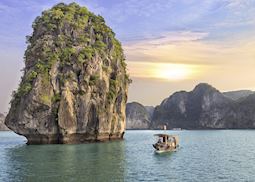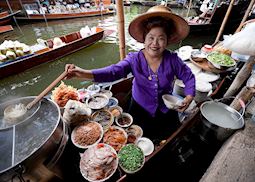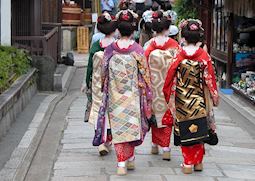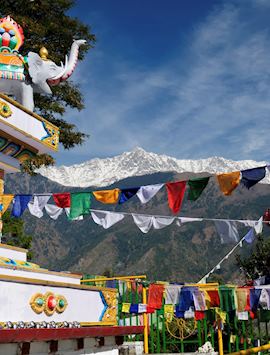

Tailor-made India holidays shaped around your passions
A country by name, but a continent in scale, India in one word is diversity. To guide you where to go when faced with such rich variety, our India specialists use the experience of their own travels to create your tailor-made holiday to India.
The north is banded by the snow-crowned peaks of the Himalaya. Moving south, you pass through Rajasthan, a microcosm of India with its forts, palaces and temples, as well as the Taj Mahal. Central India shelters leopards, elephants and the Bengal tiger. In India’s northeast corner, Calcutta still exudes its colonial heritage in a landscape of Bengali mansions and neo-Gothic architecture. West-coast Mumbai is an improbable proposition — a hub of manufacturing where you can wander among Art Deco architecture or through a teeming bazaar. Down in India’s south, cruising Kerala’s backwaters on a converted rice barge is a suitably relaxed way to embrace this region’s laid-back approach to life.
Suggested tours for India
Take a yoga class in Varanasi, search for tigers in Ranthambhore National Park, and walk through fragrant spice plantations in Kerala. Our suggested itineraries are a great starting point as you begin to plan your trip to India.
Suggested activities for India
Watch the sun rise over the Taj Mahal, explore Old Delhi City on a guided tour, and take a private tour of Jaipur. Whatever interests you, our specialists will suggest experiences designed to enhance your trip to India.
-
Keralan houseboat/rice barge ![Alleppey Backwaters, Kerala]()
Keralan houseboat/rice barge
KeralaKeralan houseboat/rice barge
Locally known as “kettuvallam”, these vessels have been converted into simple, furnished houseboats, with en suite bedrooms, an open lounge and eating area, a deck, and a kitchenette.
View details -
Taj Mahal at sunrise ![Sunrise at the Taj Mahal, Agra]()
Taj Mahal at sunrise
AgraTaj Mahal at sunrise
The principal reason for almost everyone’s visit to Agra is to see the Taj Mahal. You’ll go in the morning, when it’s less crowded and you can find a peaceful spot to admire it from.
View details -
Shimla Toy Train ![Toy Train to Shimla]()
Shimla Toy Train
ShimlaShimla Toy Train
To appreciate the best views provided by the lofty train ride on the historic metre gauge line, you will catch the train from Shimla to Kandaghat station where you will be met by your driver.
View details
Why travel with Audley?
- 100% tailor-made tours
- Fully protected travel
- Established for over 25 years
- 98% of our clients would recommend us
Best time to visit
Our specialists advise on the best months to visit India, including information about climate, events and festivals.
Request our brochure
Covering all seven continents, The World Your Way shows you how you can see the world with us. It features trip ideas from our specialists alongside hand-picked stays and experiences, and introduces our approach to creating meaningful travel experiences.
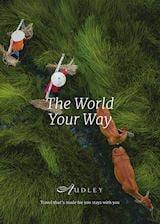
Useful information for planning your holiday in India
The official language is Hindi which is spoken by about 30% of the population, but English is often used for official or commercial purposes. Additionally, there are more than 100 other regional languages and dialects, including Punjabi, Bengali, Gujarati, and Oriya, which are widely used in the north, and Tamil and Telugu, which are common in the south. Other regional languages are Marathi, Kannada, and Malayalam. The northern Muslim population largely speak Urdu.
India’s currency is the rupee (Rs). You can’t buy rupees outside of India — tell our representative at the airport and they’ll direct you to an ATM.
Tipping for good service is expected in India and your specialist will provide more details. In some homestays and hotels, particularly in Kerala, you’ll find a communal tip box, usually in reception. Please give your tip to your host to distribute fairly if a tip box isn’t provided.
Like its cultures and languages, India’s cuisines are highly regional and what you eat and drink will vary depending on where you visit. However, there are a few things you’ll find no matter where you go. For instance, thali are traditional meals made of different curries and dal with traditional accompaniments — all served in small bowls and arranged artistically on a large tray. The exact contents vary by region.
You’ll also find an abundance of street foods everywhere from big cities to rural roads with nothing else around, which you can explore on a guided tour. Another common sight — chaiwallahs selling spiced milk tea on seemingly every corner. For a more in-depth look at India’s long history with tea, consider a visit to one of the country’s many tea plantations.
For a more hands-on approach, we can arrange private cooking classes with families across the country, from Delhi to Tellicherry.
For the latest travel advice for India, including entry requirements, health information, and the safety and security situation, please refer to the Foreign, Commonwealth & Development Office website.
What you experience in India depends on where you go in this vast and varied country, but the most popular sight is the Taj Mahal. Located in the Golden Triangle, Agra’s renowned mausoleum is an ethereal sight during a sunrise visit. Nearby, you can also track tigers in Ranthambhore National Park or meet artisans in the markets of Jaipur. In the southwest, you might relax on a rice barge-turned-houseboat through the backwaters of Kerala.
Wherever you go, we can arrange cooking lessons to help you explore the many facets of India’s regional dishes, like Rajasthani cuisine in Jodhpur or Mopillah cuisine in Tamil Nadu. To get to know individual ingredients better, you might tour a tea plantation.
For your first visit to India, we suggest visiting Delhi, Jaipur, and Agra, home of the Taj Mahal. Known collectively as the Golden Triangle, these three ancient cities are treasure troves of Mughal culture, including forts, palaces, and bazaars. You can also include a visit to nearby Ranthambhore National Park, to look for elusive tigers. Your specialist will help you find the region’s many hidden corners to give you a different perspective on the area. For example, you might opt to stay in rural villages instead of the big cities.
On a second visit, you might explore Tamil Nadu, where brightly painted temples stretch to the sky. Here, you can visit the 49 shines of Ranganathaswamy Temple in Trichy, take a cooking class in Pondicherry, and then end your trip on the backwaters of Kerala. Or you could explore Bengal culture and cuisine, starting in Calcutta. From there, take a lazy cruise through Assam on the mighty Brahmaputra, paired with a rhino safari in Kaziranga National Park.
Our specialists will build your trip to suit your personal tastes, but you can get inspired by browsing our example itineraries.
From sumptuous palaces to humble homestays, where you stay in India depends on where you’re visiting and your personal style. The big cities offer a wide array of options including thoroughly modern five-star hotels and boutique guesthouses in well-preserved Victorian-era buildings. Outside the cities, you might opt for a stilted bungalow on a tea plantation, a remote lodge, or a safari camp in the heart of the jungle.
If you’re visiting the Golden Triangle, you can also choose to stay in a converted fort, a regal palace, or a historic family mansion known as a haveli. And further south, in Kerala, you can dive deeply into rural life with a homestay, known as theravads, or a rice barge-cum-houseboat that glides along the sleepy backwaters. Your specialist will suggest the best stays for you, but you can get an idea of the options available on our accommodation page.
The best places to see tigers in India are the Kanha, Satpura, Pench, and Tadoba national parks. Scattered across the central states of Madhya Pradesh, Maharashtra, and Chhattisgarh, they’re home to the country’s greatest concentration of Bengal tigers. You’re also likely to see India’s other wildlife, like sloth bears, leopards, deer, and elephants, who all roam freely through the protected jungles.
However, if you’re visiting Rajasthan and don’t want to venture so far afield, you can also include time in nearby Ranthambhore National Park.
You should bring clothing that covers your head, knees, and shoulders if you plan on visiting holy places in India.
A direct flight from London to Delhi takes about 8.5 hours, depending on airline.
The time zone in India is GMT +5:30.
The best way to get around in India is a combination of private driver and internal flights for longer trips. The traffic in India is dense and hectic, so we’ll arrange a private car and driver for all your trips while you’re in the country. Some of the drives might be long, but the car will be air conditioned, and your driver can suggest stops to break up the journeys.
On days when you don’t have any planned experiences, we suggest you call our partners to have a private car rather than take a taxi.
If you’re interested in taking one of India’s trains, we can arrange for your ticket. Our representative will meet you at your hotel and escort you to your seat inside the train, cutting through the complexities at the station. As you disembark, you’ll find another representative waiting on the platform.
Use our travel tool to find up-to-date visa and passport requirements for India. Enter where you’re travelling to and from (including any stopover destinations en route or flight layovers), along with your intended travel dates and passport details, for a full list of requirements.
Your doctor can provide you with vaccine advice for India, but you should also ensure you’re up to date with the recommended vaccinations for your home country. You can also check the suggested vaccinations on the Travel Health Pro website.
India in pictures
Our expert guides to travelling in India
Written by our specialists from the viewpoint of their own travels, these guides will help you decide on the shape of your own trip to India. Aiming to inspire and inform, we share our recommendations for how to appreciate India at its best.
-
![My travels in India]()
My travels in India
On your tailor-made trip through India’s western foothills, you could make chapattis in Amritsar’s Golden Temple, watch the eccentric Pakistani border crossing ceremony or ride to Shimla on a toy train — as India specialist Nick recently discovered.
-
What to do in Kerala: our highlights guide ![Alleppey Backwaters, Kerala]()
What to do in Kerala: our highlights guide
What to do in Kerala: our highlights guide
Kerala’s slow pace of life is a gentle introduction to India, with tranquil backwaters, manicured tea plantations and fishing villages to explore. India specialist Tara lends her advice for how to make the most of your time there.
Read this guide -
Luxury rail journeys through India ![Narrow-gauge railway near Darjeeling]()
Luxury rail journeys through India
Luxury rail journeys through India
India specialist and former Mumbai resident Alison shares her experiences of luxury train journeys in India. She has picked out some of the most interesting routes and explains why they’re a fascinating way to explore India.
Read this guide -
River cruises in India ![Varanasi, India]()
River cruises in India
River cruises in India
Take in the history, wildlife and culture of northeast India on a river cruise. Our India specialist Sarah shares some of her favourite things to see and do while cruising along the Brahmaputra, Ganges and Hugli rivers.
Read this guide -
Top 10 trips to India ![Step well, India]()
Top 10 trips to India
Top 10 trips to India
Would you prefer to cruise along the Lower Ganges, soaking up India’s heritage and culture, take a train through the heartland of Rajasthan, or combine a stay in the Himalayan foothills with time on Kerala’s palm-fringed coast? We’ve curated our specialists’ top India tour ideas to help you plan your next trip.
Read this guide


